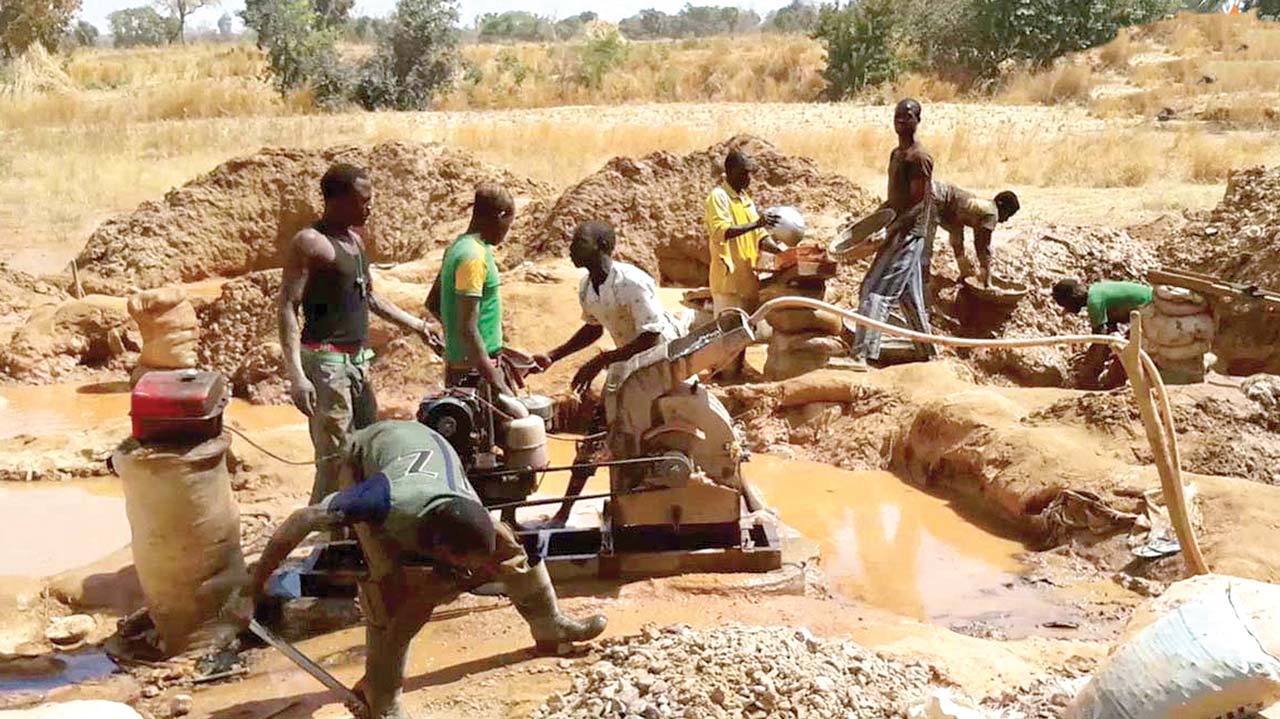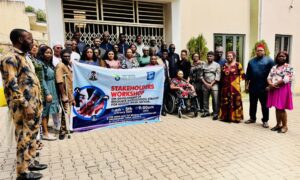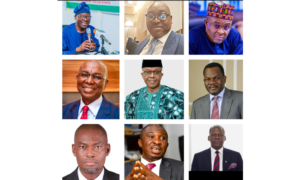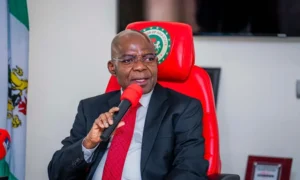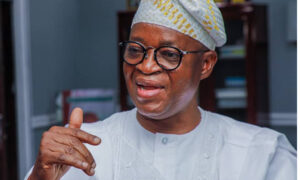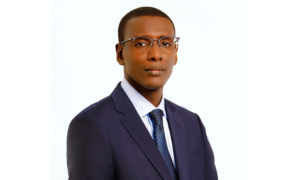BY MARTHA AGAS
Illegal mining, a global cankerworm, is eating deep into Nigeria’s mineral wealth; it costs the nation billions of naira loss yearly.
Nigeria is endowed with natural resources ranging from industrial metals to various precious stones.
It has 44 types minerals spread across its states in commercial quantities, including the seven critical minerals needed for the energy transition.
To highlight Nigeria’s minerals potential, a German company, Geoscan, conducted a preliminary survey revealing that the country has an estimated 750 billion dollars’ worth of solid minerals underground, a quarter of which remains untapped.
Experts say the sector has great potential to contribute significantly to Nigeria`s Gross Domestic Product (GDP), a goal President Bola Tinubu’s administration is pursuing in its economic diversification drive.
They argue that this potential should provide Nigeria with a strategic advantage in driving its development.
However, they regret that successive governments have prioritised the oil sector, leaving the mining industry unregulated and vulnerable to infiltration by artisanal and illegal miners.
They say this neglect enabled illegal mining to flourish, worsening security challenges as banditry and kidnapping surged in mining states.
Consequently, the government-imposed bans in Zamfara where such actors flocked due to its vast gold deposits; the five-year ban was later lifted in December, 2024.
The Minister of Solid Minerals Development, Dr Dele Alake, lamented that the directive had created a vacuum, which illegal miners exploited to deprive the nation of its resources.
Industry stakeholders also agree with the minister, asserting that illegal mining had fuelled banditry and significantly contributed to the sector’s monopolisation by a few powerful elites in Nigeria who exploited its mineral wealth.
Upon his appointment, the minister declared a state of emergency in the sector, stating that powerful individuals involved in illegal mining were funding banditry and obstructing the sector’s revenue-generating potential.
Although his pronouncement sparked nationwide controversy, stakeholders continue to insist that Nigeria’s mineral wealth remains in the hands of a few powerful individuals who appear untouchable.
Sen. Adams Oshiomhole, representing Edo-North, raised serious concerns recently.
He spoke during the Senate Committee on Solid Minerals 2025 budget defence report presentation to the Committee on Appropriations. Oshiomhole alleged that some retired military officers were engaged in illegal mining, employing sophisticated machinery and procuring arms to sustain their activities.
The lawmaker urged the Federal Government to combat illegal mining with same might it deploys against illegal oil bunkering.
“My position is that we shouldn’t be lamenting; we should fix the problem; we should tell the executive you must deploy exactly the same force that you deployed against illegal oil bunkering in the Niger-Delta.
“That same force should be deployed to deal with criminals who have money; when I say criminal, it can be a retired general, it can be a retired permanent secretary, it can be a retired trade unionist or a retired labour leader,” he said.
Civil Society Organisations also agree with him; they warned that the situation could undermine Tinubu’s economic diversification policy, aimed at enhancing the solid minerals sector to contribute significantly to the country’s GDP.
The Executive Director of Renevyln Development Initiative (RDI), Philip Jakpor, said that powerful interests were behind illegal mining, depriving Nigeria of revenue from the sector.
Jakpor, however, argued that while stakeholders like Oshiomhole had made the allegations, addressing the issue required strong political will.
He said that the suspects should be named and arrested, noting that if those responsible for the menace remained unidentified and un-apprehended, it pointed to a deeper underlying problem.
“It is either collusion at certain quarters in government or total negligence, but I suspect it is collusion.
“Some people in government are benefiting maximally from illegal mining and so choose not to halt the practice. “
Jakpor pointed fingers at expatriates, particularly the Chinese, alleging that they make up the majority of illegal miners in Nigeria.
He noted that their firms, initially registered as agro-commodity outfits, later engaged in the illegal extraction of lithium and other precious minerals.
“Almost every other month, some Chinese nationals are arrested; since they are registered as agro-commodity firms, who is responsible for monitoring their activities?
“Legislative oversight should ensure they are doing what they are supposed to do; the government needs to wake up to that call, “he said.
Agreeing to this position, Dr Abdullahi Jabi, the Chairman, North Central Zone, Campaign for Democracy, Human Rights Advocacy, Civil Society of Nigeria, lamented that expatriates, particularly the Chinese, were engaged by the powerful interest in Nigeria to work for them.
He attributed the state of unemployment of youths as one of the factors as the powerful interests were engaged them in illegal mining and banditry.
“The rich actually sponsor, support, protect and provide security for those involved in illegal mining and they are the ones selling the products for personal benefits.’’
While acknowledging Oshiomhole’s courage in his outcry over the monopolisation of the mining sector, he also accused lawmakers of being complicit in the act.
“They are part and parcel of this; their in-laws, brothers, nephews and others are part of the beneficiaries looting Nigeria’s common wealth for few individuals to be the almighty.
“This is in terms of enrichment, against the vast majority of the people who are impoverished by either poor policy of government or by design of government to put them in perpetual poverty and hunger, such as now, “he said.
Jabi also alleged that some traditional rulers where mining activities were high, also connived with illegal miners, mostly expatriates, who came with their equipment to cart away Nigeria’s mineral wealth.
He described the situation as complex, resulting from factors such as the negligence of constitutional duties by political leaders and public office holders.
According to him, to address the situation, a holistic legal framework must be established to ensure that the solid minerals sector receives the required attention.
He emphasised the need for adequate logistics to enable the government to implement strict measures for the benefit of the people, rather than a few individuals who were exploiting the nation’s resources.
Worthy of note, retired generals have faulted Oshiomhole’s allegations. Retired Maj.-Gen. Bamidele Olawumi, in a reaction, said Oshiomhole’s remarks were aimed at tarnishing the image of retired generals who had served the nation meritoriously.
He urged Oshiomhole to validate his claims with evidence and present the proof to appropriate authorities.
“If he possesses credible evidence of any retired general involved in illegal mining, he should report such individuals to the Department of State Services or other relevant authorities,’’ he said.
While some stakeholders are optimistic about the political will of Tinubu’s administration to address the menace given the results it has already recorded in its mining reforms, others share Oshiomhole’s view that it can only be tackled using the same approach applied to oil bunkering in the South-South.
Doing otherwise, they say, will sustain the vicious cycle.


